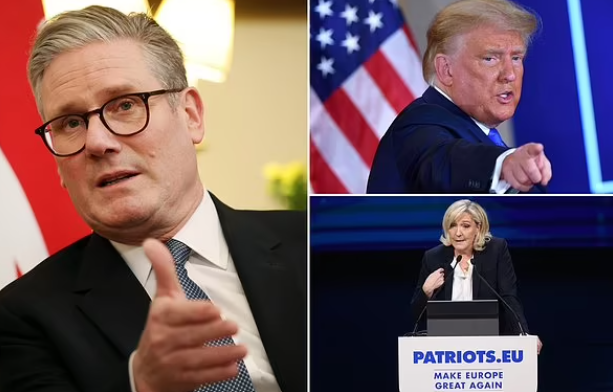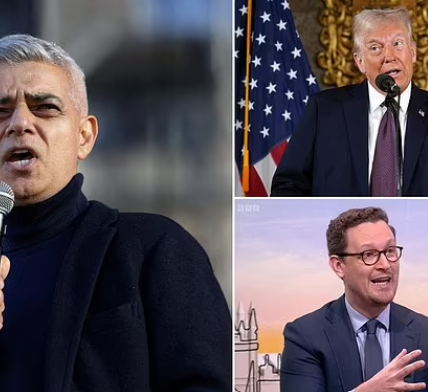The UK faces a major hit to the economy if Donald Trump pushes ahead with ‘reciprocal’ tariffs, analysts have warned.
There are fears the US president could impose 21 per cent levy on goods from Britain in order to offset the impact of VAT.
The National Institute of Economic and Social Research (NIESR) has estimated that duties of that scale could deepen the woes for Rachel Reeves by knocking 0.4 percentage points off GDP growth for the next two years. That would be equivalent to around £24billion.
More evidence has emerged of the problems confronting the Chancellor with the £10billion ‘headroom’ in her spending plans believed to have been wiped out by stalling growth after the Budget and spiking debt interest costs.
The NIESR said the government’s books looked to be exactly balanced over the forecast period – raising concerns that tax rises would be needed if there is an unexpected setback.

There are fears Donald Trump could impose 21 per cent levy on goods from Britain in order to offset the impact of VAT

The National Institute of Economic and Social Research (NIESR) has estimated that duties of that scale could deepen the woes for Rachel Reeves
‘Without changing taxation and spending plans, this means that there is no buffer through which to absorb cyclical economic shocks were they to materialise over the remainder of the parliament,’ the think-tank said.
NIESR said it was projecting that the UK economy would grow by 1.5 per cent this year, lifting its previous forecast of 1.2 per cent.
It said the growth would be driven mainly by the increased spending programme announced in the October Budget, which it expected would have a ‘tangible effect’ throughout the year.
But economists at the organisation said this was likely to ‘only be a temporary boost’ for growth.
That forecast, prepared at the end of January, is far more optimistic than the Bank of England, which last week downgraded GDP predictions for this year from 1.5 per cent to just 0.75 per cent.
According to Bloomberg, early estimates produced by the Treasury’s OBR watchdog ahead of the Chancellor’s Spring statement suggest the government is running a small deficit.
In October, the Government said it planned to increase spending by around £70billion a year, supported by increased borrowing and higher business taxes.

The Bank of England’s updated forecasts last week suggested that inflation is easing more slowly than hoped, and growth has been weak
But firms have warned they are being forced to curb investment and hiring as they shoulder tax rises, such as increased national insurance contributions, and wage increases from April.
Mr Trump has already slapped a 25 per cent duty on steel imports, including from the UK, but has promised to unveil another wave of tariffs by today.
The US does not have the equivalent of VAT at a federal level, with states levying their own taxes.
George Saravelos, the global head of FX Research at Deutsche Bank, pointed to concerns that the US would target VAT as part of the ‘reciprocal’ tariffs.
He told the Telegraph that would be ‘much more damaging’ for the UK, potentially meaning a 21 per cent tariff on imports instead of just 1 per cent.


